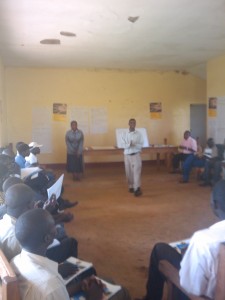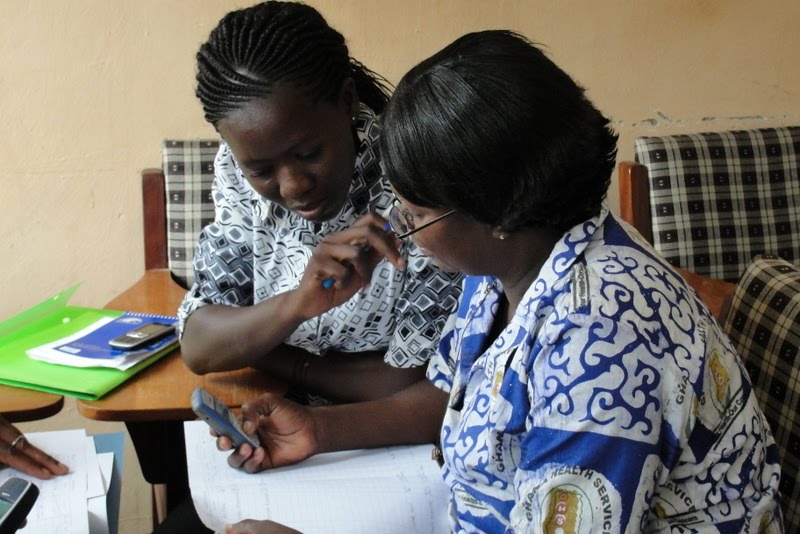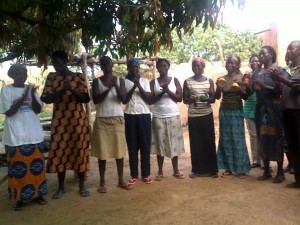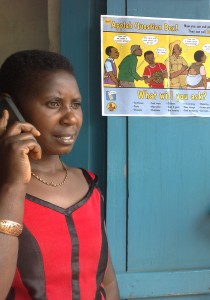Posts Tagged ‘Communication’
Friday, June 11th, 2010
The village Chief's band performs
Durbars are community entry ceremonies that must be done in all of the 11 zones where we are working with Mobile Technology for Community Health (MoTeCH) . They include bringing offerings to the Chief, telling the community members about MoTeCH, dancing and hopefully getting the community members to formally “accept” MoTeCH as a valuable health service. Durbars last for several hours, usually take place under a tree and we’re holding them for all 11 zones this week so we can keep on schedule with our launch activities. (more…)
Tags: Communication, Community Health Worker, Culture, Ghana, Grameen Foundation, ICT4D, ICTI, mHealth, Mobile, MoTeCH, Pregnancy
Posted in Africa, Community Health Worker, ICTI, MoTeCH | 2 Comments »
Thursday, May 20th, 2010
In early 2009, Grameen Foundation went to Uganda with the idea of creating a fluid and effective two way communication channel between rural farmers

CKWs in training
and the world of agricultural experts, development agencies, traders and commercial players. Through this loop, rural small holder farmers would be given livelihood saving agricultural information generated by the experts and the big players would keep informed on conditions on the farm from adoption of best practices to available produce for sale. (more…)
Tags: AppLab, CKW, Communication, Community Knowledge Worker, Farming, Gates Foundation, Grameen Foundation, ICT4D, ICTI, Innovation, Mobile, research, Technology, Uganda
Posted in Africa, AppLab, Community Knowledge Worker, ICTI | 1 Comment »
Tuesday, January 12th, 2010

Joyce Ndago and Maria Nuela, two of our MoTeCH field staff
In December we had our first workshop to introduce and test our mobile phone technology for MoTeCH to community health workers (CHWs) in the Upper East Region of Ghana. Prior to this workshop, much of our field research and testing has focused on building content for our “Pregnant Parents” application, but today we were focused on how MoTeCH can help practitioners deliver high quality antenatal and neonatal health care. (more…)
Tags: AppLab, CHW, Communication, Community Health Worker, Culture, Ghana, Grameen Foundation, Health, ICT4D, ICTI, Innovation, mHealth, Mobile, MoTeCH, SMS, Technology
Posted in Africa, Community Health Worker, ICTI, MoTeCH | 1 Comment »
Tuesday, October 27th, 2009

The "MoTeCH Song" being performed
As a part of our MoTeCH initiative, we are holding content workshops to learn more about what types of information local women want and need in relation to their health. In Accra, Ghana, Eve’s Pregnancy School has offered lessons about pregnancy and motherhood to women for over 10 years, and has seen over 2,000 mothers through safe pregnancy and delivery. The founder, Florence, gives bi-monthly classes to pregnant women and mothers; she attended our first content workshop recently and had lots of fantastic input for our program. One of the key takeaways from the workshop was that singing and music is an important part of Ghanaian culture and this class opened with the women singing a local song about womanhood, empowerment, and feminine beauty. It definitely got people excited! Part of the class was then given over to the group chanting “positive utterances” such as “my body is strong”, “i will have a safe delivery”, “my family loves me”, and “my husband loves me”. Teaching was interspersed between these more fun and participatory sessions. (more…)
Tags: Communication, Culture, Ghana, Health, ICT4D, ICTI, Innovation, Mobile, MoTeCH, Pregnancy, Song, Video
Posted in MoTeCH | 2 Comments »
Friday, October 23rd, 2009

Calling into Question Box
During the test of concept phase of our Community Knowledge Worker initiative, AppLab Question Box (AQB) was one of the services that the CKWs provided to rural communities. Grameen Foundation worked with Appfrica Labs, and US based NGO, Open Mind, to pilot this service. AQB is a live, local language hotline service that brings the Internet and expert advice to the homes and market stalls of individuals who may never see a computer, visit an agricultural specialist, or read in English. Between April and September, villagers in Uganda’s Mbale and Bushyeni districts had access to the service to ask agricultural, education, recent events and other questions. (more…)
Tags: Agriculture, Appfrica Labs, Bushyeni, CKW, Communication, Community Knowledge Worker, Grameen Foundation, ICT4D, ICTI, Innovation, Mbale, Mobile, NARO, Open Mind, Question Box, Technology, Uganda
Posted in Community Knowledge Worker | 2 Comments »
Thursday, October 22nd, 2009
Last week in Uganda I was fortunate to attend a meeting in Busano subcounty, Mbale district, with some of the Community Knowledge Workers (CKWs) – local farmer leaders empowered with mobile applications to improve the livelihoods of their communities by distributing and collecting relevant information about agriculture – and their clients, the smallholder farmers we all seek to benefit. There was a lively discussion of the pros and cons of a variety of information services we have been testing nearby. One farmer, Elias Mabala, then stood up and spoke about how his income improved more than 100% last harvest by virtue of having greater access to market information through the CKW assigned to serve the information needs arising in his village. Stories like that explain why we come to work each day. (more…)
Tags: Agriculture, CKW, Communication, Community Knowledge Worker, Farming, Gates Foundation, ICT4D, ICTI, Innovation, Mbale, Mobile, Technology, Uganda
Posted in Community Knowledge Worker | No Comments »
Rapid Prototyping Goes “Up Country” with MoTeCH
Monday, October 19th, 2009
Since the beginning, the Mobile Technology for Community Health (MoTech) team has been focusing on using rapid prototyping for figuring out what will – and won’t – work in the rural environment. A week ago, the team headed to the poorest region in Ghana – the Upper East (UER) – to set up a series of exercises to determine whether pregnant mothers would be interested in asking questions about their pregnancy and newborn care via mobile phones. We were wanted to understand what types of questions they were interested in having answered, and what the technical (mobile phone usage, SMS vs. voice, network issues) aspects of providing this service to parents in rural areas would be. (more…)
Tags: Communication, Ghana, Grameen Foundation, Health, ICT4D, ICTI, Innovation, Mobile, MoTeCH, Technology
Posted in MoTeCH | No Comments »
Grameen Foundation´s ICT Innovation Program – Approach and Philosophy
Thursday, October 15th, 2009
We officially launched our Information and Communication Technology (ICT) Program two years ago, when we began our Application Laboratory (AppLab) efforts in Uganda. This initiative, in collaboration with the mobile operator MTN and Google, built on the successful Grameen Foundation/MTN Village Phone Program. With over 10,000 Village Phone Operators, this served as a unique testing ground for developing applications and information services tailored to the needs of the poor. Over nearly two years we explored the potential of more than 50 services, actively tested a subset of these, and in the end of June launched a suite of five services nationwide (additional details at www.applab.org). (more…)
Tags: AppLab, Communication, Ghana, Grameen Foundation, ICT4D, ICTI, Indonesia, Innovation, Mobile, Technology, Uganda
Posted in ICTI | No Comments »





